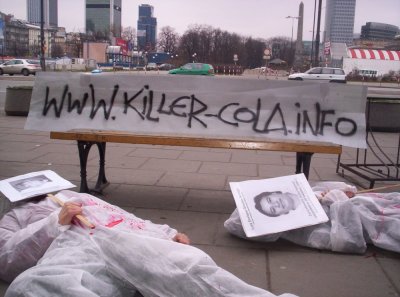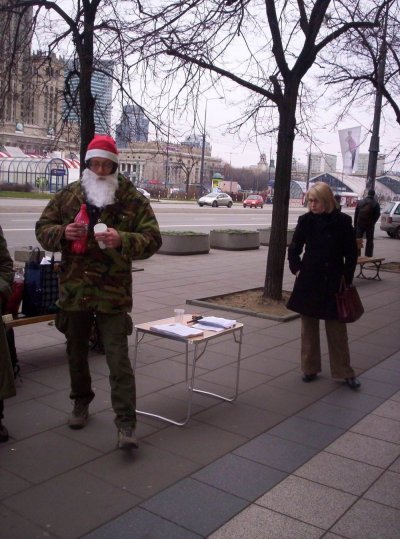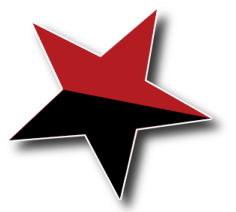Killer Coke's Santa Claus reveals he is a 'closet terrorist'
Note: Another Killer Coke Christmas street action is planned for 12 noon next Saturday, December 22nd, at Galeria Centrum (opposite H&M)

"Ho, ho, ho - have some bloody Coke"
Murder, torture, kidnapping and illegal detention by violent paramilitaries, frequently aided by bottling plant management, has been the tragic reality for Coca-Cola's Colombian employees for 2 decades now. Members of the SINALTRAINAL trade union ordinary employees carry a death sentence around their necks. Yet an appeal from Javier Correra, president of their union - “We want justice. We want people to know the truth about what is going on in Colombia against Coke workers. Now that you know, will you please help us?” - has not fallen on deaf ears.
Killer Coke Action Ingredients
Responding to this call on Saturday afternoon, activists in Warsaw decided to bring together the key ingredients of a well-known recipe, long-proven to scare the underpants off Coca-Cola's corpocrats:
Posters, flyers, an appeal letter, placards, a table, a stand, megaphone
Santa suits, a paramilitary uniform, guns (plastic), trade union worker suits
Watered down red paint, old Coca Cola bottles, a digital camera, a video camera
Activists who know a lot more about Coke's dark history of human rights abuses than Coca-Cola's public relations department in Poland.
Prologue:
Soon after we gathered and were starting to get dressed for our roles, we learned from H&M's bored and agitated security guard that the 'light gray' pavement stones we were standing on are “property of the Galeria Centrum shopping area”, and therefore we could only stage our street theatre action in the 'dark grey' pavement zone some inches away.
Even the brightest bureaucrat or police officer would have a hard time making this shit up. After we ignored a few more threats from the security guard, “I'll call the police if you don't move,” we got back into focus to perform our action and engage the public about Killer Coke.
Act 1, 'Killer Santa Claus'
The half-paramilitary/half-Santa Claus actor loaded his weapons when he saw Coca-Cola's trade unionists giving out information about Coke's crimes. One by one he assassinated the workers, with impunity. 3 activists staged a die-in while playing the roles of the slain Coca-Cola employees and former SINALTRAINAL trade union leaders:
.jpg)
Luis Enrique Giraldo Arango, murdered on the 20th of April by paramilitaries – he was employed at Carepa bottling plant.
Isidro Segundo Gil, was murdered on the 5th of December 1996 by paramilitaries while he was on duty at Carepa bottling plant.
Adolfo de Jesus Munera Lopez, murdered on the 31st of August 2002 at Baranquilla bottling plant.
The narrator explained the desperate circumstances for Coca-Cola's trade unionist employees in Colombia and appealed to the public to show solidarity with the families of the deceased and other workers by demanding Coca-Cola use their influence and profits to safeguard their employees security.
Act 2, 'The Bloody taste of Coca-Cola'
Santa Claus then proceeded to fill out cups of symbolic blood (red paint) and passers-by were invited by our narrator to enjoy the bloody taste of Coke. Thankfully, everybody boycotted the Coke offered once they had become aware of the wide-ranging allegations and mounting evidence that the Coca-Cola corporation is ethically out of order.
Santa's elves gave out flyers and entered discussions with members of the public, explaining the reason behind the Killer Coke campaign and appealing to them to join the boycott. Furthermore, people were requested to write emails to the major Polish NGO, Polish Humanitarian Organisation, to demand it end it's Christmas campaign with Coca-Cola. Lots of interest was shown and feedback was very positive.
Act 3, 'Face to Face with Poland's Coca-Cola PR Chief'

Coca Cola's paramilitary Santa with Coca Cola's PR chief in the background
Meanwhile, on the outskirts of the main events, a second Santa engaged in a heated discussion with the head of Coca-Cola's Public Relations Department. Initially we thought she was going to join in on our action, but as it turned out she had decided to give up a weekend away with her family so as to monitor our activities.
Despite the fact that she asserted she would not work with Coca-Cola if she believed they were not a force for good in society, she had no rebuttals for the list of Coke's crimes put to her, some of which are listed here:
*Advertisements in Hitler Youth booklets in the 1930's
*Calls from Martin Luther King for a wide-scale boycott of Coke due to discrimination of coloured workers
*The poisoning and depletion of water supplies in India (especially in Kerala state)
*Repression and murder of trade unionists in Guatemala in the 1970s and the resulting success of an international boycott campaign
*Payment of $190 million in compensation for 2,000 black workers in the year 2000
*Human Rights Watch reports on the use of child labour in El Salvador and Amnesty Internationals appeals to Coke for better enforcement of International labour and human rights standards
Informing her about the list of Coke's crimes since the 1930's, very few of which she was aware, put her in a position whereby she dismissed proven human rights breaches by Coca-Cola, without having any arguments to the contrary. She claimed that our information leaflets 'personally' attacked her, though in the article she referred to it only stated 'the Coca Cola Public Relations Department.' The fusion of the human person with the corporate product is one of the most tragic consequences of corporate loyalty.
Attempts of emotional attachment, crying wolf, is the usual tactic of the corporate PR spokesperson. However, when we established that she was actually being paid for 'attending' our event as Coke's 'representative' (in other words, damage control person), the second Santa proposed that her time would be more valuably spent at home rather than defending the indefensible.
She even admitted that she would not be getting paid overtime, so we pointed out to her that she was entitled to it for unsocial working hours under Poland's labour laws. Additionally, we stressed that we would support any strike action her and other Coke workers decided to take on this or other worker rights issues.
Of course, we also invited her to inform her colleagues that the best way to show solidarity with workers in Colombia and elsewhere would be to boycott Coke and call for a general strike. Given Coca-Cola Enterprises adopted a cost-cutting restructuring plan in 2007 that included axing 3,500 jobs, so a possibility is not far-fetched.
We eagerly await a revolution amongst Coca-Cola's rank and file in Poland.
Other Coca-Cola employees from Colombia who have paid with their lives for their trade union activities are:
Avelino Chicanoy - Pasto bottling plant - murdered by paramilitaries in 1989
Jode Eleasar Manco David – Carepa, murdered by paramilitaries on the 8th of April, 1994
Luis Enrique Gomez Granado – Carepa, murdered by paramilitaries on the 23rd of April 1995
Jose Librado Herrerra Osorio – Carepa, murdered by paramilitaries on the 26th of December 1996
Oscar Dario Soto Polo – Monteria, murdered by paramilitaries on the 21st of June 2001
Further information regarding Colombia
In northern Colombia, Chiquita Brands International donated $1.7 million between 1997 and 2004 to the notorious right-wing paramilitary A.U.C. (United Self-Defence Forces of Colmbia), whose death squads have destroyed unions by terrorising workers and murdering thousands of innocent civilians. Leading officials in the multinational fruit giant have admitted granting permission, ludicrously alleging it was to protect their workforce and facilities. A court case against Chiquita officlas of helping the A.U.C. to smuggle weapons is pending.
The A.U.C. is deemed a terrorist organization in the United States, so consequently federal prosecutors brought charges against Chiquita in March of this year due to their collaboration. Chiquita pleaded guilty to the accusations and are due to pay a $25 million fine as a result.
A corporate giant and human rights abuser has fallen.
In Poland, we stand shoulder to shoulder with our colleagues in Colombia and elsewhere in their fight for justice to transpire. If we persist, the giant of Coca-Cola will also have to pay for its crimes.
The links between Colombia’s political and military elite, the U.S. administrations staunchest ally in South America, with the AUC paramilitary group, have already resulted in the arrest of more than a dozen current and former Colombian congressmen. Even the government of President Alvaro Uribe is under serious threat due to the extent of the cooperation and the consequent grave human rights abuses perpetrated.
http://www.portfolio.com/news-markets/international-news/portfolio/2007/...
Coca-Cola's chairperson recently let the cat out of the bag when he claimed at a recent stockholder gathering that any independent investigation of the facts at Colombia's plants would interfere with the current court case SINALTRIANAL is taking against Coke for its alleged crimes.
http://media.www.loyolaphoenix.com/media/storage/paper673/news/2007/10/2...






